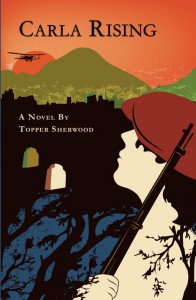 Click here for details….
Click here for details….
Author’s Statement
As a journalist in the 1990s, I enjoyed researching articles on the “West Virginia Mine Wars” of 1890-1923 – although these labor battles are not easy stories to tell.
To me, the traditional “heroes vs villains” story – even the “poor underclass vs. wealthy oppressors” – wasn’t enough. Both sides could claim “victory,” for example, following the 1921 “Battle of Blair Mountain.” And both sides clearly suffered abysmal defeats in these conflicts which continue to polarize the region a century later.
In writing Carla Rising, my first novel, I was extremely mindful of parallels/allegories for today’s audience. Most notably perhaps: the rise of oligarchs, like my Sheriff Riley Gore, in local/national politics around the world today.
The political domination of energy companies of that time reminded me of the rise of “Big Data” today — of Amazon’s and Google’s effect on publishing, and media-making, especially in the United States. In a word, I personalized the plight of coal miners whose lives and work were cheapened by their employers – much in the same way that Internet firms have cheapened conscientious and time-consuming work of research and writing for news media, for books and nonfiction broadcasts.
Another allegory: During years of studying and publishing about these events of 1921, I was struck by the collaboration between the coal company’s private police/military force and public officials. Federal and state officials did not challenge the presence of a private company’s paramilitary force playing a role in the mining conflict – similar to Blackwater’s role in Iraq or, perhaps, private prisons in today’s United States.
Carla Rising also presents the split on the Left during that time – a split that resulted in the conscious purge of leftists during and after the New Deal, including the black-listing of Socialists and Communist Party members. After the 1980-88 administrations of Ronald Reagan (who participated in black-listing in Hollywood), it was easy to see how ‘mainstream’ liberals and media (the “free press”) generally were called upon to fill the void left by yesterday’s “reds.” It has also become easy to see the evolution of anti-“liberal”, anti-democratic demonization that continues today (2017), part of what has long been moving the United States further and further to the right.
Some of Carla Rising‘s characters represent the vulnerable middle class – most notably, Mary Rising, Carla’s mother – caught in the middle and pressured to take sides in an increasingly polarized political and social environment.
So, there are plenty of modern allegories to find in Carla Rising. I hope you enjoy it.
– Topper Sherwood,
Berlin, 2017
